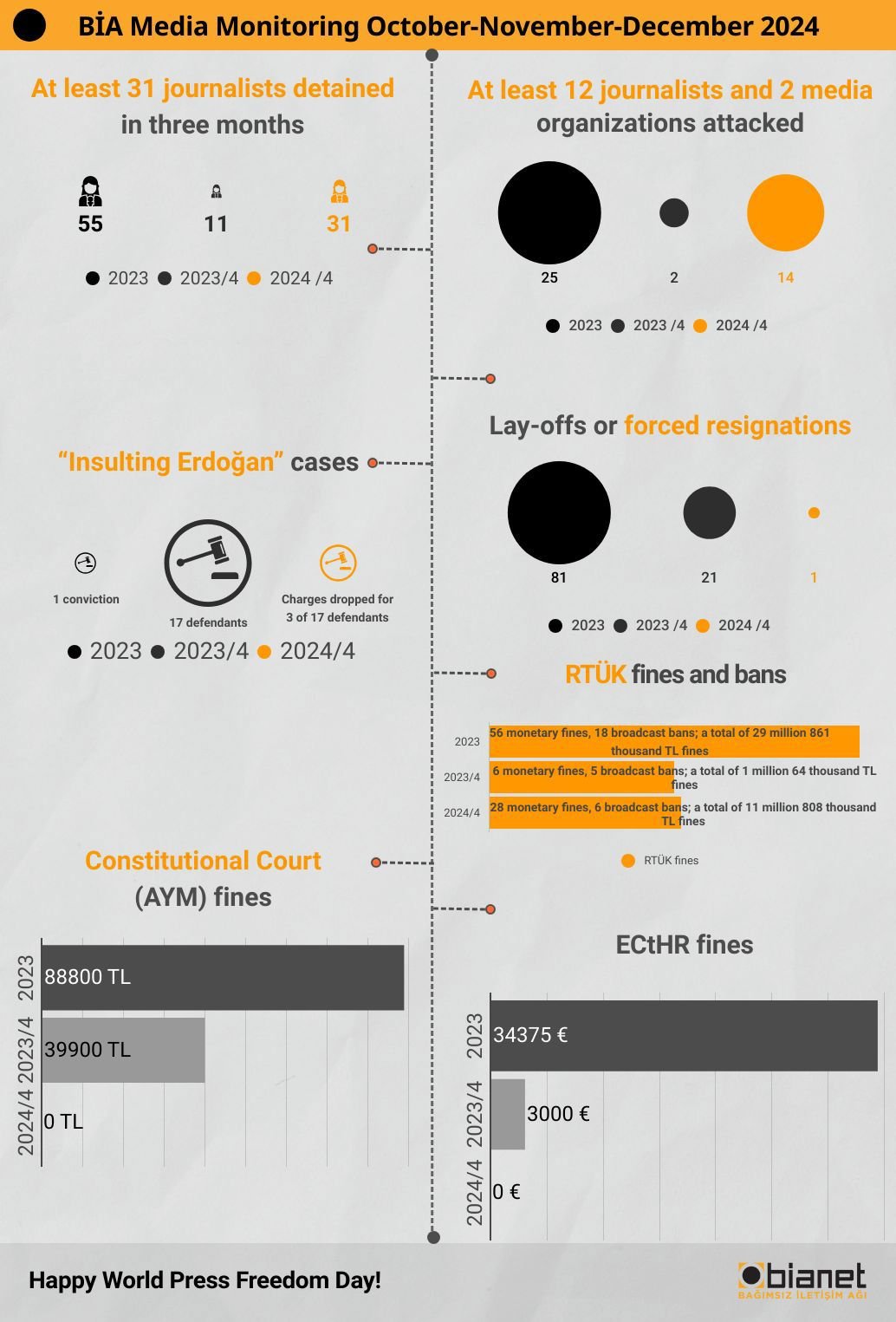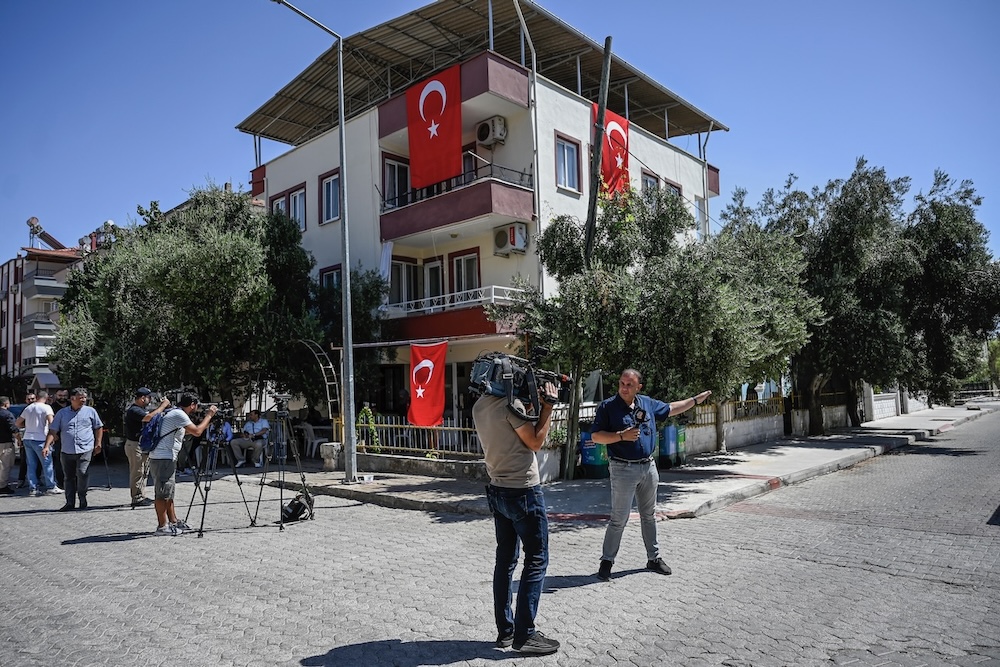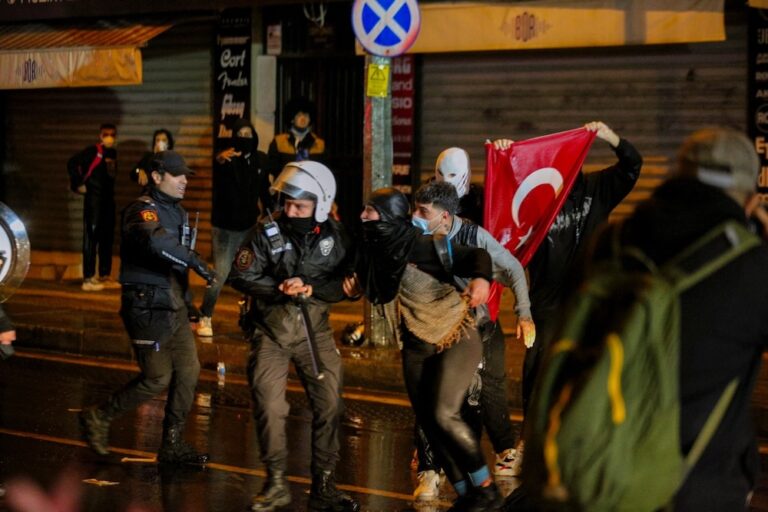In addition to the detention of 31 journalists, there were at least 12 physical attacks on the press; and 17 journalists faced charges of "insulting the president".
This statement was originally published on bianet.org on 9 January 2025.
By Erol Önderoğlu
The BİA Media Monitoring Report aims to pinpoint the specific tendencies in repression targeting journalists, and reveals how, in the detention of 31 journalists in the last 3 months, judiciary control measures have been abused, and although there are no longer legal grounds for it, censorship continues with brazen opportunism.

Infographic: Barış Dural
Tomorrow is January 10, Working Journalists’ Day!
In Turkey, with the target of silencing independent and critical journalism and weakening its ties with the public, a highly strategic policy of repression is carried out, where detentions, prosecutions and online censorship are implemented simultaneously.
As the open threats of Devlet Bahçeli, the chairperson of the National Movement Party (MHP) and the partner in government, and MHP circles, towards journalists continue without facing any judicial sanctions whatsoever, investigative journalists, TV commentators and YouTubers, who recently have discussed geostrategic issues as well as the domestic agenda, have been targeted one after the other by judicial repression.
The October-November-December 2024 BİA Media Monitoring Report, which aims to present tendencies in repression targeting journalists, reveals how judicial control measures were abused in the detention of 31 journalists in the last three months, and how, although there are no longer legal grounds for it, censorship continues with brazen opportunism. According to the report, journalists known well by the public, including Fatih Altaylı, İsmail Saymaz, Özlem Gürses and Seyhan Avşar, are being closely marked by the judiciary to send a message to the public.
The 2024 World Press Freedom Index produced by Reporters Without Borders (RSF), featuring 180 countries, places Turkey 158th, where authorities do not stop at instrumentalizing the Anti-Terror Law (TMK) and the Turkish Penal Code (TCK) against journalism. In the last two years, renowned journalists have been targeted on grounds of “spreading misleading information” (disinformation), while the draft law on “agents of influence” has, for the last six months, caused concern for media and civilian society organizations that receive international funding for their work.
Attacks on 12 journalists and two critical TV channels
The threats by Devlet Bahçeli, chairperson of the National Movement Party (MHP) and partner in government, protected by his immunity shield as a member of parliament, stating, “we are making notes, one by one, of enemies of the MHP who are nesting in TV channels, sorry examples for commentators, media organizations and bosses with Halk TV first and foremost among them, and when the time is right we will make them pay inch by inch” seriously debilitate journalists’ security across the country.
In the last three months, at least 12 journalists and two critical TV channels suffered physical violence. Five attacks took place in Çorum, four in Diyarbakır, and one each in Balıkesir, Istanbul and Kars.
Devlet Bahçeli also launched a verbal attack on journalist Hilal Köylü who asked him, “Do you and Erdoğan have any differences of opinion regarding the solution process?” Journalist Şule Aydın, who was previously targeted by Bahçeli as he called her and other journalists “the four buffoons”, faced a further attack when graffiti containing words of sexual harassment were written on the wall of her home.
31 detentions in three months; judicial control measures becoming more prevalent
In the period from October to December, 31 journalists were detained for varying periods as they monitored social actions on grounds that included “membership of an illegal organization”, “praising a crime or a criminal”, “disinformation”, “openly belittling state institutions” and “resisting police”.
Journalists Nevşin Mengü, Özlem Gürses and bianet reporter Tuğçe Yılmaz were among victims of the arbitrary and widespread judicial control measures such as a “foreign travel ban”, “regular visit to police station to provide signature” and “house arrest”. Mengü withdrew the interview she had conducted with Salih Muslim, co-chairperson of the Democratic Union Party (PYD) in Syria, reportedly sought with red notice, considering that it could constitute the crime of “praising a crime or a criminal”, yet she was still detained and a case was filed against her.
20 media representatives were detained during a protest held in Şişhane, Istanbul, against the killing of Nazım Daştan and Cihan Bilgin in Northern Syria.
Investigations galore against renowned journalists
In the last three months, many renowned journalists, including Fatih Altaylı, İsmail Saymaz, Özlem Gürses and Seyhan Avşar, have become the target of investigations on charges of “propaganda of a terrorist organization”, “belittling state institutions and organizations” and “openly spreading misleading information to the public”. An investigation is also continuing regarding journalist Ruşen Takva, who criticized Turkey’s policy towards Kurds in Syria via social media.
12 acquittals and four convictions in the last three months
In the last three months, five journalists (Osman Akın, Faruk Eren, Ali Duran Topuz, Furkan Karabay, Dicle Müftüoğlu) were acquitted from charges including, “targeting individuals who have been employed in the struggle against terror”, “openly belittling the military or the police force”, “provoking the public towards hatred and animosity”, “failure to (properly) publish a refutation” and “membership of an illegal organization”. During the same period, seven journalists (İzel Sezer, Batuhan Batan, Furkan Karabay (3), Ahmet Sever, Görkem Kınacı, Uğur Şahin and Uğur Koç) were acquitted from charges of “insulting” and/or “slander”.
On the other hand, journalist İnan Kızılkaya was sentenced to a judicial fine of 7 thousand 80 TL, for insulting former Criminal Court of Peace Judge Bekir Altun of the Istanbul Court House, and journalist Gözde Bedeloğlu received the same fine for insulting MHP member of parliament Sermet Atay. Tigris Haber Newspaper Editorial Coordinator Naci Sapan received a judicial fine of 2 thousand 700 TL for an article where he criticized the government trustee administration of the Diyarbakır Metropolitan Municipality. The fine was deferred, nevertheless, Sapan appealed.
Journalist Can Ataklı also received a deferred 10-month-sentence on charges of “provoking the public towards hatred and animosity”.
“Insulting the President”: Charges dropped for three defendants out of 17
In the last three months, at least 17 journalists and cartoonists have been involved in cases related to charges of “insulting the President” (Barış Pehlivan, Ozan Alper Yurtoğlu, Deniz Yücel, İhsan Çaralan, İnan Kızılkaya, Ahmet Sever, Hayko Bağdat, Baransel Ağca, Erk Acarer, Julien Serignac, Gerard Biard, Laurent Sourisseau, “Alice”, Ramazan Yurttapan, Haydar Ergül, Furkan Karabay (2) and Rüstem Batum). With a total of 84-year-imprisonment asked, charges were dropped in two cases involving three journalists (İhsan Çaralan, İnan Kızılkaya, Hayko Bağdat).
Article 299 of the Turkish Penal Code (TCK) titled “Insulting the President”, has formed the ground for more than 250 journalists being tried during President Erdoğan’s 10-year-reign, with at least 77 of them (some deferred) being sentenced to imprisonment or judicial fines.
Actors in criminal actions targeting journalists: The government and the judiciary
In the last three months, at least 24 journalists have been tried in penal proceedings within the scope of cases filed by the President and his family members, Turkuvaz Media Group Chairperson Serhat Albayrak, members of the judiciary including Istanbul Chief Public Prosecutor Şaban Yılmaz, Anadolu Chief Public Prosecutor İsmail Uçar [in charge of Istanbul’s Anatolian side] and Istanbul Deputy Chief Public Prosecutor Mehmet Yılmaz and members of parliament from the Justice and Development Party (AKP) and National Movement Party (MHP).
4 million TL demanded from five journalists and six institutions
In the period from October to December, at least five journalists (Timur Soykan, Barış Pehlivan, İsmail Arı, Ceren Sözeri ve Hazal Ocak) and six media organizations were placed on trial within the scope of five cases of “violation of personal rights” with a total demand of 4 million 15 thousand TL. For instance, the case filed by Halkbank against BirGün newspaper and investigative journalist Timur Soykan for the news report titled “550 million TL loan from Halkbank to mafia” began to be heard in December.
Insisting on online censorship
Following the Constitutional Court’s (AYM) repeal as of 10 October of the abused Article 9 on “violation of personal rights” of the Internet Law, Criminal Courts of Peace continue to implement online censorship, this time on the basis of “national security and public order” referred to in the same Law. At least 38 news reports and links were blocked from access as a result of applications from the government and MHP circles and also bureaucrats and business people.
The Radio and Television Supreme Council (RTÜK) demanded that Cumhuriyet newspaper apply for a license to continue its broadcast via its YouTube account and allowed for a period of 72 hours.
In the last three months, broadcast bans were brought in two instances, the attack on the Turkish Aerospace Headquarters (TUSAŞ) headquarters in Ankara, and an armed attack on a courtroom at the Bursa Court House. The terrestrial broadcast of Açık Radyo, its license revoked following the fines and broadcast bans it had received for referring to the “Armenian Genocide” was also terminated.
Fines and partiality from Radio and Television Supreme Council
In the last three months, the Radio and Television Supreme Council (RTÜK), in addition to terminating the terrestrial broadcast license of Açık Radyo, issued administrative fines totalling 578 thousand 360 TL to TV companies for news and programme content. The fines were based on violations of guidelines related to “human dignity” (2) and “national and spiritual values”.
The Radio and Television Supreme Council (RTÜK) Chairperson Ebubekir Şahin, who has made fun of the “impartiality” principle with his public statements, sees no harm in making veiled threats against critical media organizations.
Strategic “online censorship” and “Press Advertisement Institution” rulings from Constitutional Court
Article 9 on the “violation of personal rights” of the Internet Law no.5651, annulled on 11 October 2023 by the Constitutional Court (AYM) on grounds that it limited press freedom and freedom of expression was repealed on 10 October.
The Constitutional Court issued another strategic verdict regarding the instrumentalization of press advertisements as a tool of punishment: Applications to the court from the Evrensel, Cumhuriyet, BirGün, Sözcü and Tunceli Emek newspapers were assessed together, and fines issued by the Press Advertisement Institution’s involving blocking advertisements were formally recorded as “violations of press freedom and freedom of expression”.
“Inadmissibility” verdict from ECtHR
The European Court of Human Rights (ECtHR) issued an inadmissibility verdict regarding the application made for sendika.org, the news website to which access has been blocked numerous times since July 2015 on charges of “breaching national security”, and which has not been opened despite a Constitutional Court ruling in its favour; the court stated that it was “sufficient for the Constitutional Court to recognize the violation and the compensation given is adequate”.
Journalism against disinformation and gossip
Media ombudsman and journalist Faruk Bildirici criticized in his articles penned in the last three months how certain journalists have departed from questioning social and political issues depending on political processes.
Bildirici reacted to the article penned by Ebru Küçükaydın titled, “Has the Özgür Özel mystery been solved in Şehzadeler district?” and reports that followed. In his article titled “Absurdity of ‘allegedly’ and behind-the-scenes info”, Bildirici wrote that “Journalism is not gossip, it is the profession of transmitting the facts. Journalists are responsible of proving what they write”.
The Turkish Journalists’ Association (TGC) and some members of the Radio and Television Supreme Council condemned Akit TV, which invited ultranationalist and murderer in 1979 of journalist Abdi İpekçi, Mehmet Ali Ağca as a guest to a programme.
NOW TV journalist Alican Uludağ reacted to the intervention of the Presidency’s Directorate of Communications Center for Countering Disinformation (DMM) which the Constitutional Court (AYM) had disentitled from “countering disinformation”.
Fight against impunity exceedingly weak
The efforts of judicial authorities in Turkey to protect journalists who are attacked or threatened due to their legitimate activities have proven exceedingly weak:
The personal protection officer of Elazığ Mayor Şahin Şerifoğulları, who physically attacked journalist Ardıl Batmaz while he was following the schedule of a minister, was given a “deferred monetary fine”.
Former Halk TV presenter Şirin Payzın filed charges against Zafer Partisi (Victory Party) Chairperson Ümit Özdağ for his online verbal attacks, however, her claim for compensation was rejected.
A court in Bursa acquitted two defendants on trial for carrying out an armed attack against journalist Yaman Kaya.
Detained by torture three years ago, former AFP photojournalist Bülent Kılıç continues to be tried on charges of “resisting police” and “insulting a public officer”.
Ekol TV lays off Rabia Çetin
The Ekol TV management had themselves invited and recruited Rabia Çetin on 2 September, however, they dismissed her on 30 October.
After İzmir, in Zonguldak, too, many journalists held an action against economic problems, the discrediting of journalism and censorship at the Miner’s Monument in the city, proclaiming “We Can’t Make Ends Meet”.



